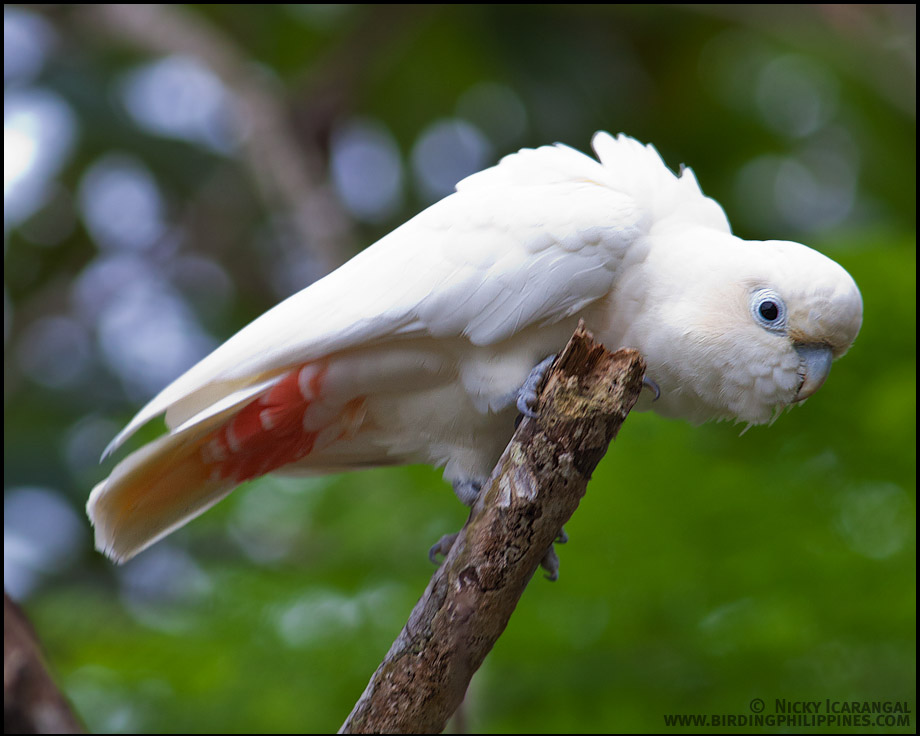Coal plant in Palawan poses threat to endangered Philippine Cockatoo, group says
Is electrocuting the Philippine cockatoo, locally known as the Katala, the price Palaweños are willing to pay for charging their mobile phones and laptops?
This is the envisioned trade-off that the non-governmental organization Katala Foundation Inc. (KFI) worries about If a proposed 15-megawatt coal-fired power plant were to be built in the coastal barangay of Panacan in Narra town in southern Palawan.
The power plant's proposed location on the Palawan mainland is about one kilometer from the Rasa Island Wildlife Sanctuary, which harbors the critically endangered Katala as well as other threatened species like the grey imperial pigeon, the marine turtle, and the dugong.
View Rasa Island in a larger map
The birds are known to fly off to the Palawan mainland in search of food during the day, coming back at sunset to roost in the treetops of the forested island. The province is one of the last remaining habitats of the Philippine cockatoo, which is also found in limited numbers in other parts of Palawan.
In addition to the pollution from the power plant, KFI fears that the structures will block the bird’s ability to fly from the mainland to the island, “which in turn would result in a reduction of the carrying capacity of Rasa Island for the species, since parent birds could not any more provide their young with sufficient food.”
In a statement released on Monday, the NGO said, “Experts and KFI stated that the coal plant would result in cockatoo casualties due to collisions and electrocution at the feeder power lines.”

Apart from environmental concerns, the group questioned the harmful effects of the power plant to the health and livelihood of the nearby fishing village and farmlands in Narra, which is considered the rice granary of Palawan.
The Consunji-led DMCI Power Corp. that is putting up the plant has refused to comment on the issue. Reached for comment, the company’s legal counsel Francis Allan Rubio told GMA News Online, “We are coming up with a response [regarding] our next course of action.”
'Special case'
The Palawan Council for Sustainable Development (PCSD), which is responsible for approving projects in the ecologically important province, issued a Strategic Environmental Plan (SEP) clearance for the project last February 22. The permit paves the way for the issuance of the required Environmental Clearance Certificate for the coal plant.
But according to KFI, the municipal government of town of Narra -- which prides itself as the “Philippine Cockatoo Capital of the World” -- was not consulted about the project. The municipal and provincial clearance should have been issued first before a SEP clearance could be granted, the group's leader said.
“Kahit walang endorsement [from the local government unit, SEP clearance can be obtained],” KFI’s chief operating officer Indira Widdmann told GMA News. “[That] has been a practice.”
Alex Marcaida, the PCSD staff's media bureau and public affairs chief, explained that the coal power plant was a “special case” considering the urgency of the Palawan power crisis that has resulted in frequent brownouts, especially in the booming capital city of Puerto Princesa.
“Urgency was not the reason for PCSD [to approve the clearance] but it is for the business sector,” he said.
Because of the increasing electricity demand in the province, the Palawan Electric Cooperative awarded a 25-megawatt supply contract to DMCI Power Corp. in July last year. Aside from the coal plant, this includes a 5-megawatt diesel-fired power plant that began commercial operations before 2012 ended, as part of an earlier deal.
Relocation of coal plant
Before the approval of the proposed coal plant, Marcaida noted that the PCSD’s technical staff had recommended that the project be relocated to a less environmentally critical zone in Brgy. San Isidro, also in Narra town. The village is located in the southern portion of the town, which is farther away from the protected cockatoo sanctuary of Rasa island.
Nevertheless, he noted, “Tama naman ang [lokasyon ng proyekto] dahil nasa multiple use zone. [Hindi pa noon na-consider] ang critical habitat for wildlife.”
He said the staff was unaware if the members of PCSD, which is composed mostly of elected local officials, took their recommendation into consideration. A copy of the SEP clearance, which contains the conditions for approval, has yet to be released, he added.
“Kritikal na usapin ‘yung conservation ng Katala. Ang mitigation lang na pwede ay ilipat ang planta sa ibang lugar… [It is a] critical condition on our part. Hindi magkasundo ang staff and council. First time ito na ‘di magkasundo,” he detailed.
KFI’s Widmann said the proposed coal-fired power plant poses another challenge for Palawan, where environmental groups have been fighting pollution from mining for decades.
“May challenge na nga kami sa mining, ngayon ito naman. Coal is not even a clean source of energy. It is not renewable,” she said.
“Give more emphasis on the environment. Ito ang kakaiba sa Palawan to the rest of the Philippines,” added Widmann, whose group is involved in conservation efforts in various parts of the province.
Marcaida concurred: “PCSD tries to balance economics and conservation. It is yet again a balancing act to protect the environment while also looking at possible economic gains.” — DVM/YA, GMA News



